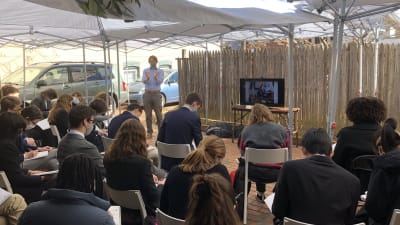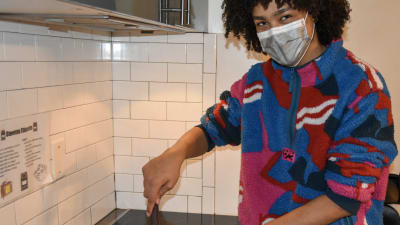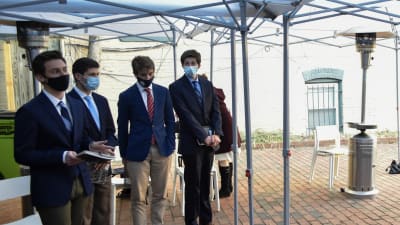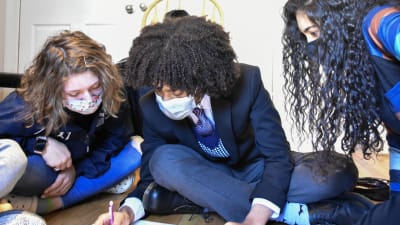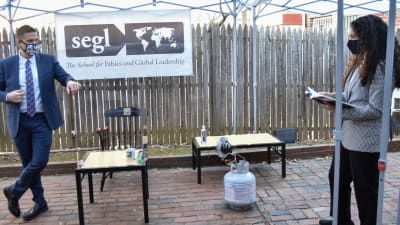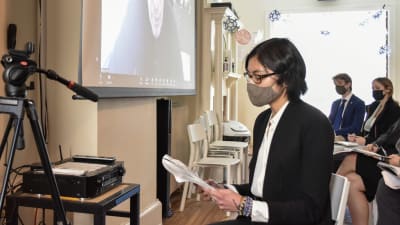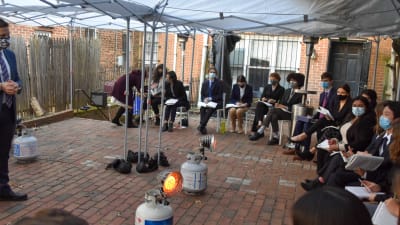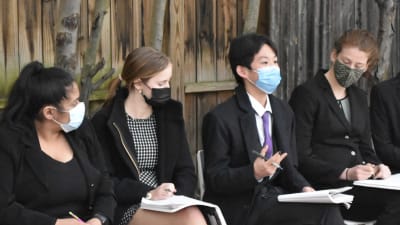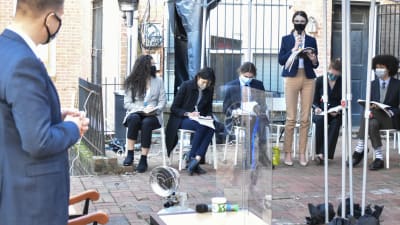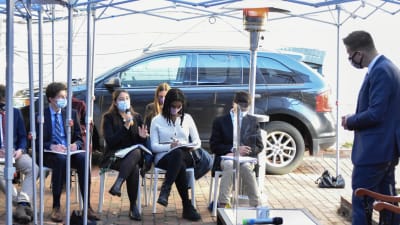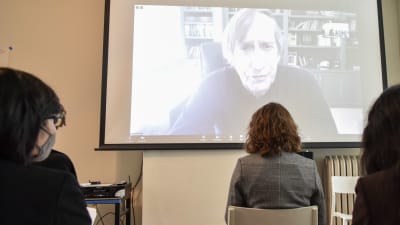The Israeli-Palestinian Conflict (and a special conversation with U.S. Rep. Karen Bass)
The Biden Administration’s attempt to reset American foreign relations has far-reaching consequences.
Can Palestinians and Israelis make peace, and if so, how? Is the conflict intractable? Or could new leaders (perhaps some of them SEGL graduates) find a new solution? How will the Biden Administration impact the These questions, and many others, made up our latest case study. Along the way, we met with three key leaders whose work continues to impact the conflict.
Our students began with SEGL’s account of Israeli-Palestinian history: the competing promises of T.E. Lawrence and the Balfour Declaration, the competing boundaries in 1948, 1967, and today, the competing visions for the future within Israel and within the Palestinian leadership. Our historical account makes every attempt to be unbiased, but we also tell the students that many observers on both sides would want to add, subtract, or edit each PowerPoint slide we shared. Critical thinking and questioning are a must in this area of study!
(Another SEGL truism: if, after a case study, you want to hear a view different from the ones presented, say something! If there is enough interest, we can often arrange for a supplementary speaker later in the semester; if there is not enough interest, any interested student can set up her or his own meetings during a free period.)
Our first guest was longtime SEGL guest speaker–and advisor to six Secretaries of State–Aaron David Miller. Miller, who now works at the Carnegie Endowment for International Peace helped provide context for the current status of the conflict and answered questions about his time as a lead negotiator for the U.S. at the 2000 Camp David II discussions (across the table from Mr. al-Omari) and other key negotiations. (Two days before we met him, Dr. Miller co-authored this Politico opinion piece.)
Next, we welcomed Elad Strohmeyer, spokesperson for the Israeli Embassy in DC. Strohmeyer presented an energetic, Israeli-centric view of not only the conflict, but his government’s view of the Trump Administration, the recent choice to move the U.S. embassy to Jerusalem, and other current hot topics. He also shared his passion for LGBTQ rights in Israel. (Strohmeyer is quoted in recent articles here and here.)
Our final guest was Ghaith al-Omari, a former top advisor to Palestinian leader Mahmoud Abbas and a negotiator in the 2000 Camp David peace talks (he is also the 2015 winner of the SEGL Golden Mug Award). Al-Omari, who now works with the American Task Force on Palestine and the Washington Institute for Near East Policy, shared stories and strategies from his time as a negotiator. For example: it is not enough to negotiate so that your side “wins.” You must also ensure that the speech your “opponent” gives to her people allows her to claim victory as well–otherwise, the deal will fall through. (Mr. al-Omari was recently quoted in The Times of Israel [here and here] and The New York Times [here], among other publications. )
As you might expect, the three viewpoints were quite different, though students also expressed surprise at several key shared beliefs. Learning how to hear the other side, how to ask tough-but-respectful questions, and how to discuss the most deeply-felt of issues are key leadership traits, and also essential parts of an SEGL education.
This week our students also took part in a favorite SEGL activity–the Leadership Styles exercise. With two questions (“Is your first instinct to observe or speak when in a group making a decision?” “When you make important decisions, do you decide with your head or your heart?”) the students divided themselves up into four classic leadership styles: Driver, Expressive, Analyst, and Supportive. Each group completed the same given task, but ended up with very different results; the ensuing conversation revealed, among other insights, the importance of having each style reflected in any decision making group (or, perhaps, in any decision making leader!).
Another highlight this week was a special conversation with U.S. Representative Karen Bass (D-CA). Bass, the second Member of Congress we’ve met this spring, is Chair of the Congressional Black Caucus, Chair of the House Foreign Affairs Subcommittee on Africa, Global Health, Global Human Rights and International Organizations, Chair of the House Judiciary Subcommittee on Crime, Terrorism and Homeland Security, and was short-listed as a Vice Presidential nominee last year).
Students asked Congresswoman Bass a variety of questions: everything from gentrification in her District to Chinese investment in Latin America to advice she has for young change makers. Bass’ energy for our students was palpable and her concise but informative answers earned praise from our students.
Next up: Climate change!


